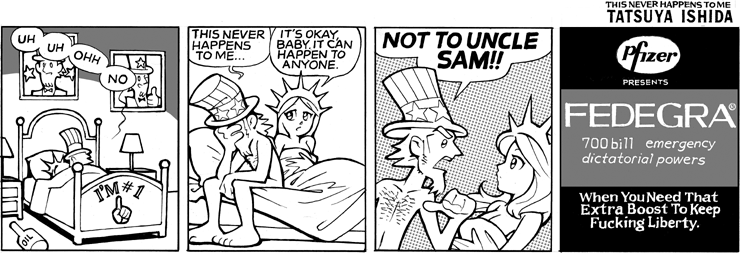All of these come from Sinfest. If I thought I’d have trouble going into the US next time I travel, this man is for sure going to be deported to Guantanamo Bay :)





The beaver is a proud and noble animal
Notes from a bemused canuck
All of these come from Sinfest. If I thought I’d have trouble going into the US next time I travel, this man is for sure going to be deported to Guantanamo Bay :)





Sarah Palin is scary. She has no experience, is a complete right-wing nutjob and would put many religious fundies to shame… And if the republicans win, she’s second in line to the throne, behind the oldest president at his inauguration.
Sleep well, kiddies.
In the land of the free, it is possible to win the popular vote and lose the electoral vote, and therefore the election. It is also possible to win the election with less than 50% of the voting population. Both of these scenarios, as well as others, have happened in actual elections.
There have been 12 Presidential elections that were decided by less than a 1% margin; meaning if less than 1% of the voters in certain states had changed their mind to the other candidate the outcome of the entire election would have been different.
Case and point: in 2000, if only 269 Floridians had voted with their heads instead of with their ass (or if the hanging chad issue hadn’t stolen the election), Al Gore would have won the election and the Dubya era would only have been a bad what-if scenario.
Source: https://www.msu.edu/~sheppa28/elections.html#2004
Fighting back against McCain and Palin’s effort to paint themselves as mavericks rolling up their sleeves for a Washington housecleaning, Obama today charged Palin with flip-flopping on her opposition to Alaska’s infamous “Bridge to Nowhere” project. And in some of his strongest language yet, Obama suggested that, in its new ad, the McCain-Palin ticket was simply trying to “make stuff up”.
You can’t just recreate yourself,” said the Democratic nominee. “You can’t just reinvent yourself. The American people aren’t stupid.”
They are. And if you’re basing your hopes on getting elected on this fact, you’re fucked mate.
TSA Snafu Damages Nine Planes at O’Hare Field – Pilots Furious with Misstep
Nine American Eagle airplanes were grounded Tuesday after a TSA inspector, conducting an overnight security check, used sensitive instrument probes to climb onto the parked aircraft at Chicago’s O’Hare Airport. A TSA official confirmed the incident.
The TSA agent, as part of spot inspection of aircraft security, climbed onto the parked aircraft using control sensors mounted on the fuselage as handholds, according to a TSA official.
“Our inspector was following routine procedure for securing the aircraft that were on the tarmac,” said the official. The TSA agent was attempting to determine if someone could break into a parked aircraft, according to the agent.
Pilots were furious at the TSA misstep.
“The brilliant employees used an instrument located just below the cockpit window that is critical to the operation of the onboard computers,” one pilot wrote on an American Eagle internet forum. “They decided this instrument, the TAT probe, would be adequate to use as a ladder,” the pilot wrote.
Another pilot wrote the TSA agents, “are now doing things to our aircraft that may put our lives, and the lives of our passengers at risk.”
The TSA has been conducting such overnight spot checks at airports around the country.
Source: ABC
Remind me to never, ever, ever again to to the US. If this is the land of the free, they can shove it where the sun don’t shine.
Federal agents may take a traveler’s laptop or other electronic device to an off-site location for an unspecified period of time without any suspicion of wrongdoing, as part of border search policies the Department of Homeland Security recently disclosed.
Also, officials may share copies of the laptop’s contents with other agencies and private entities for language translation, data decryption or other reasons, according to the policies, dated July 16 and issued by two DHS agencies, U.S. Customs and Border Protection and U.S. Immigration and Customs Enforcement.
“The policies . . . are truly alarming,” said Sen. Russell Feingold (D-Wis.), who is probing the government’s border search practices. He said he intends to introduce legislation soon that would require reasonable suspicion for border searches, as well as prohibit profiling on race, religion or national origin.
DHS officials said that the newly disclosed policies — which apply to anyone entering the country, including U.S. citizens — are reasonable and necessary to prevent terrorism. Officials said such procedures have long been in place but were disclosed last month because of public interest in the matter.
Civil liberties and business travel groups have pressed the government to disclose its procedures as an increasing number of international travelers have reported that their laptops, cellphones and other digital devices have been taken — for months, in at least one case — and their contents examined.
The policies state that officers may “detain” laptops “for a reasonable period of time” to “review and analyze information.” This may take place “absent individualized suspicion.”
The policies cover “any device capable of storing information in digital or analog form,” including hard drives, flash drives, cell phones, iPods, pagers, beepers, and video and audio tapes. They also cover “all papers and other written documentation,” including books, pamphlets and “written materials commonly referred to as ‘pocket trash’ or ‘pocket litter.’ “
Reasonable measures must be taken to protect business information and attorney-client privileged material, the policies say, but there is no specific mention of the handling of personal data such as medical and financial records.
When a review is completed and no probable cause exists to keep the information, any copies of the data must be destroyed. Copies sent to non-federal entities must be returned to DHS. But the documents specify that there is no limitation on authorities keeping written notes or reports about the materials.
“They’re saying they can rifle through all the information in a traveler’s laptop without having a smidgen of evidence that the traveler is breaking the law,” said Greg Nojeim, senior counsel at the Center for Democracy and Technology. Notably, he said, the policies “don’t establish any criteria for whose computer can be searched.”
Customs Deputy Commissioner Jayson P. Ahern said the efforts “do not infringe on Americans’ privacy.” In a statement submitted to Feingold for a June hearing on the issue, he noted that the executive branch has long had “plenary authority to conduct routine searches and seizures at the border without probable cause or a warrant” to prevent drugs and other contraband from entering the country.
Homeland Security Secretary Michael Chertoff wrote in an opinion piece published last month in USA Today that “the most dangerous contraband is often contained in laptop computers or other electronic devices.” Searches have uncovered “violent jihadist materials” as well as images of child pornography, he wrote.
With about 400 million travelers entering the country each year, “as a practical matter, travelers only go to secondary [for a more thorough examination] when there is some level of suspicion,” Chertoff wrote. “Yet legislation locking in a particular standard for searches would have a dangerous, chilling effect as officers’ often split-second assessments are second-guessed.”
The emphasis is mine, but it’s still disgusting. They say that it’s for the good of the people. That’s like saying “only the guilty have something to fear”. All hail Big Brother! It’s in the same vein as killing off all of Usenet in order to get rid of a few hundred binary newsgroups. It’s like using a shotgun to kill a fly – as subtle, as effective and as smart.
Source: Washington Post
Found this in the Telegraph, via Gizmondo.
This makes me sick, and violently angry. This is just another nail in the coffin of common sense, and it is another way to prove my point that industry giants will spend millions of dollars on lobbying to try and save a few thousands of dollars in losses – the end result of which means that life gets more difficult for John Q. Public.
IPods, mobile phones and laptops could be examined by airport customs officials for illegal downloads under strict new counterfeiting measures being considered by G8 governments this week, it is claimed. The measures form part of an international agreement aimed at stamping out piracy, but there are fears that individuals who have illegally downloaded songs or video clips on to MP3 players and phones for personal use could also be caught out.
They coincide with plans by the European Parliament for Internet Service Providers to be held liable if their users download illegal content, and in extreme cases, forced to disconnect people who are doing so. Illegal downloading and piracy represents the biggest single problem faced by the music, film and publishing industries, and many have been lobbying governments to introduce tough new rules to help stamp out the practice.
Earlier this month, Virgin Media resorting to writing to customers warning them that their internet services would be terminated if they persisted in file sharing. So far, little has been revealed about the Anti-Counterfeiting Trade Agreement being considered by the G8 nations, apart from a mention in the organisation’s “Declaration on the World Economy” published this week.
Backing the development of the new agreement, it said: “Effective promotion and protection of Intellectual Property Rights are critical to the development of creative products, technologies and economies.”
A leak to a technology website revealed that the focus of Acta was “border measures, particularly how to deal with large-scale intellectual property infringements, which can frequently involve criminal elements”.
However, a footnote saying that those signing up to Acta should put in place “provisions related to criminal enforcement and border measures to be applied at least in cases of trademark counterfeiting and copyright piracy”, has generated intense speculation about what it could mean for the individual. Recent research by the British Music Rights group found that the average teenager and student has 800 illegal downloads on their MP3 player. The suggestion that the new laws could be used by customs to scan MP3 players, mobiles and laptops for illegal downloads is just one of a number of potential measures that is causing concern in the technology world, leading to fevered debate about the implications on a number of websites.
Another is that mobile phone companies could contact their customers to warn them off sharing video clips. However, a source representing record labels said the practice of checking iPods and phones was unworkable.
“It is more likely to be about customs having the powers to intercept large shipments of raw materials and vast packages of MP3s with prerecorded content,” he said.
Seizing Laptops and Cameras Without Cause
Returning from a brief vacation to Germany in February, Bill Hogan was selected for additional screening by customs officials at Dulles International Airport outside Washington, D.C. Agents searched Hogan’s luggage and then popped an unexpected question: Was he carrying any digital media cards or drives in his pockets? “Then they told me that they were impounding my laptop,” says Hogan, a freelance investigative reporter whose recent stories have ranged from the origins of the Iraq war to the impact of money in presidential politics.
Shaken by the encounter, Hogan says he left the airport and examined his bags, finding that the agents had also removed and inspected the memory card from his digital camera. “It was fortunate that I didn’t use that machine for work or I would have had to call up all my sources and tell them that the government had just seized their information,” he said. When customs offered to return the machine nearly two weeks later, Hogan told them to ship it to his lawyer.
The extent of the program to confiscate electronics at customs points is unclear. A hearing Wednesday before the Senate Committee on the Judiciary’s Subcommittee on the Constitution hopes to learn more about the extent of the program and safeguards to traveler’s privacy. Lawsuits have also been filed, challenging how the program selects travelers for inspection. Citing those lawsuits, Customs and Border Protection, a division of the Department of Homeland Security, refuses to say exactly how common the practice is, how many computers, portable storage drives, and BlackBerries have been inspected and confiscated, or what happens to the devices once they are seized. Congressional investigators and plaintiffs involved in lawsuits believe that digital copies – so-called “mirror images” of drives – are sometimes made of materials after they are seized by customs.
A ruling this year by the 9th Circuit Court of Appeals found that DHS does indeed have the authority to search electronic devices without suspicion in the same way that it would inspect a briefcase. The lawsuit that prompted the ruling was the result of more than 20 cases, most of which involved laptops, cellphones, or other electronics seized at airports. In those cases, nearly all of the individuals were of Muslim, Middle Eastern, or South Asian background.
Travelers who have their computers seized face real headaches. “In a February survey of its membership, the Association of Corporate Travel Executives found that 7 percent said they’ve had electronic devices seized at the U.S. border. It immediately deprives an executive or company of the very data – and revenue – a business trip was intended to create,” says Susan Gurley, head of the ACTE, which is asking DHS for greater transparency and oversight to protect copied data. “As a businessperson returning to the U.S., you may find yourself effectively locked out of your electronic office indefinitely.” While Hogan had his computer returned after only a few days, others say they have had theirs held for months at a time. As a result, some companies have instituted policies that require employees to travel with clean machines: free of corporate data.
The security value of the program is unclear, critics say, while the threats to business and privacy are substantial. If drives are being copied, customs officials are potentially duplicating corporate secrets, legal records, financial data, medical files, and personal E-mails and photographs as well as stored passwords for accounts from Netflix to Bank of America. DHS contends that travelers’ computers can also contain child pornography, intellectual property offenses, or terrorist secrets.
It makes practical sense to X-ray the contents of checked and carry-on luggage, which could pose an immediate danger to airplanes and their passengers. “Generally speaking, customs officials do not go through briefcases to review and copy paper business records or personal diaries, which is apparently what they are now doing now in digital form – these PDAs don’t have bombs in them,” says Marc Rotenberg, executive director of the Electronic Privacy Information Center. More troubling is what could happen if other countries follow the lead of the United States. Imagine, for instance, if China or Russia began a program to seize and duplicate the contents of traveler’s laptops. “We wouldn’t be in a position to strongly object to that type of behavior,” Rotenberg says. Indeed, visitors to the Beijing Olympic Games have been officially advised by U.S. officials that their laptops may be targeted for duplication or bugging by Chinese government spies hoping to steal business and trade secrets.
Senator Sam Brownback, a Kansas Republican, agreed that CBP needs more authority to conduct searches at the border than other law enforcement officials have inside the U.S. Only in a few cases, such as strip searches, are CBP officials required to have suspicions of illegal activity, he noted. “I hope we can go through this on the basis of protecting an individual’s rights, but also looking at trying to protect the country,” Brownback said. However, Brownback said he would not want his BlackBerry searched by border agents.
Lee Tien, a senior staff attorney with the Electronic Frontier Foundation (EFF), acknowledged that border agents have more power to conduct searches than internal U.S. police. But searching and seizing laptops, which often contain an “autobiography” of their owners, should be considered unreasonable and invasive under the U.S. Constitution’s Fourth Amendment banning such searches, he said.
“EFF does not dispute that the Fourth Amendment works differently at the border,” Tien said. “But ‘differently’ does not mean ‘not at all.'”

TULSA, Oklahoma (AP) — Calling it “our King Tut's tomb,” thousands of people watched as a 1957 Plymouth Belvedere was pulled from the ground where it had been buried for 50 years as a time capsule of American Midwest culture. The concrete vault encasing the car may have been built to withstand a nuclear attack, but it couldn't keep away water.
At Friday's ceremony, protective wrapping was removed to show the mud-caked vintage vehicle covered in rust. Shiny chrome was still visible around the doors and front fender, and workers were able to put air in the tires. “I'll tell you what, she's a mess. Look at her,” said legendary car builder Boyd Coddington, who was unable to start the car as planned.
From the trunk, organizers pulled out some of the objects buried to celebrate Oklahoma's 50 years of statehood — a 5-gallon can of leaded gasoline, which went for 24 cents a gallon in those days, and rusted cans of Schlitz beer. The contents of a “typical” woman's handbag, including 14 bobby pins, lipstick and a bottle of tranquilizers, were supposed to be in the glove box, but all that was found looked like a lump of rotted leather.
Remember kids, always put the penis in the vagina…
A US judge in Georgia has overturned a ruling in which a 17-year-old man was imprisoned for 10 years for having consensual oral sex with a teenager. Genarlow Wilson, now 21, was jailed in 2005 for aggravated child molestation after he was videotaped engaging in the act with a 15-year-old girl.
The judge amended Mr Wilson's felony sentence to 12 months for misdemeanour. The ruling has not led to his release, however, as Georgia's attorney-general has said he will be filing an appeal.
The case has provoked controversy in the US with high profile figures, such as former President Jimmy Carter, supporting the release of Mr Wilson. Mr Wilson, a former high school honours student and star athlete, was found guilty by a jury of aggravated child molestation for having oral sex with a 15-year-old girl at a New Year's Eve party in 2003.
At the time the crime carried a mandatory minimum sentence of 10 years and a lifetime registration on the state's sexual offender list. Under Georgia law, if Mr Wilson had engaged in sexual intercourse with the girl he would have only been charged with a misdemeanour and would have received a much lighter sentence.
In his ruling on Monday, Superior Court Judge Thomas Wilson ordered Mr Wilson's release and said he would not be required to register as a sex offender. “If any case fits into the definitive limits of a miscarriage of justice, surely this case does,” he said.
“The fact that Genarlow Wilson has spent two years in prison for what is now classified as a misdemeanour, and without assistance from this court will spend eight more years in prison, is a grave miscarriage of justice.”
However, Attorney-General Thurbert Baker said he would file an appeal against the ruling, stating that Georgia law did not give a judge authority to reduce or modify the sentence imposed by a trial court.
Mr Wilson's lawyer, BJ Bernstein, said: “It is extremely, extremely disturbing that the attorney general would take this action now.” “In essence, the attorney general is saying, 'Keep Genarlow Wilson in prison for 10 years and keep him on the sex offender registry',” she added.
She is planning to apply for a bond to release Mr Wilson while the appeal is pending. But a public affairs officer for the state department of corrections said Mr Wilson could not be released until they received guidance from the state attorney general's office or from the court that originally sentenced him.
Emphasis mine. God bless the land of the free.
Story from BBC NEWS:
Source: http://news.bbc.co.uk/1/hi/world/americas/6743303.stm